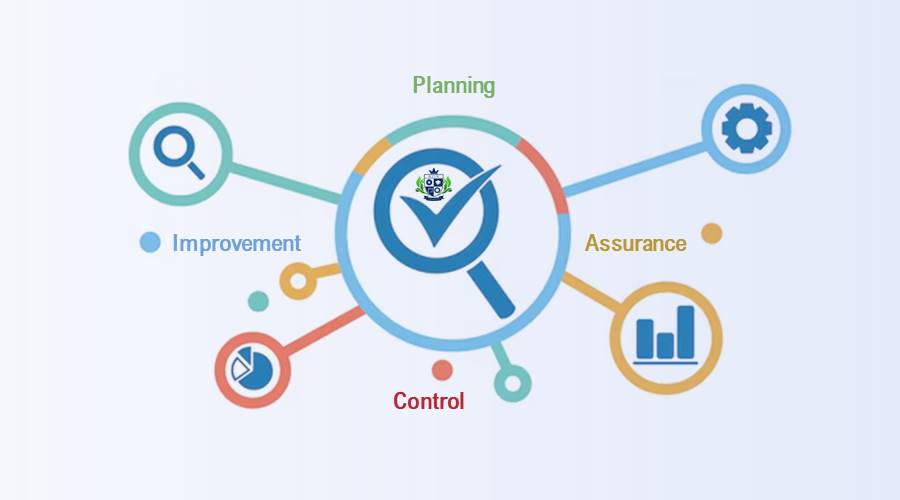Blog
Exploring Specializations and Designations in Quality Management
- January 9, 2025
- Posted by: QIIN
- Category: Blog

The ISO 9001 Framework for QMS
What training and certification, or specialization and experience, do you have, and what designation would you rather be addressed by: quality planning expert, quality assurance manager, quality control supervisor, quality improvement specialist, quality management officer, or director of quality? And so on and so forth!
Quality professionals often grapple with their designation and role within the range of specializations available in quality management. This challenge stems from the lack of thorough understanding of the comprehensive and intricate nature of quality management. According to ISO 9000:2015, quality management is part of an organization’s management that focuses on managing the quality of its products/services, just like human resource management focuses on manpower and financial management focuses on managing the organizations’ finances through various activities.
The various aspects of activities that encompass the focus of managing quality cover everything from quality planning, quality assurance, and quality control to quality improvement. ISO 9001:2015 provides a framework for these activities through its structured clauses (4–10) and the Plan-Do-Check-Act (PDCA) cycle concept.
Training and certification
By obtaining ISO 9001:2015 QMS certification, such as through QIIN’s trainings, you become empowered to perform any of the quality management activities in any organization, because the ISO 9001 standard equips professionals to effectively plan, assure, control, and improve quality across various interconnected organizational processes.
Different trainings and certifications confer the professional with educational or academic qualifications to assume a particular cadre or take certain roles and responsibilities.
Specialization and Experience
Focusing on a particular area of expertise within the broader spectrum of quality management requires developing deep knowledge and skills that enhance proficiency and value in the specific roles. While personal interest, innate abilities, and consistency in that specific area are beneficial for specialization, gaining practical exposure through daily implementations, including the ensuing successes and failures, is crucial to building experiences.
Demonstrated specialization and experience give the professional competence to take up certain position of authority with an appropriate designation.
Designations
As an example, a certified lead implementer and auditor of ISO 9001:2015 who has worked for two to three years and has overseen and prepared an organization for ISO certification through planning, assurance, control, and improvement can be called a coordinator of quality management or a QMS manager in the organization, depending. He can also call himself a QMS expert or specialist. If he then consults for two more organizations on ISO certification or quality management as a profession, he may wish to address himself as a QMS consultant.
If an organization sets up a quality or QMS department with two or more staff in it, one of them is assigned the position of head of department/unit; based on training and certification (qualification) and specialization (role) and experience, the cadre or rank amongst the staff may also differ as quality assurance officer, quality control officer, quality improvement analyst, or quality or QMS officer, etc.
Thus the size and structure of the organization determine the designations. Divisions or directorates are manned by directors, under which there are departments headed by senior managers who in turn oversee unit supervisors.
What does quality management specialization entail?
Quality Planning: This foundational, yet often overlooked, area involves setting objectives and detailing the operational processes, resources, and actions needed to achieve these goals. Effective planning sets the stage for all subsequent quality management activities. Ever heard of the Quality Architect or Quality Strategist?
Quality Assurance: Focused on building confidence that quality requirements will be met, quality assurance is proactive, involving processes that prevent issues before they arise, with a strong emphasis on establishing protocols and procedures and setting controls.
Quality Control: The most recognized specialization, quality control involves direct actions such as implementing established controls, inspections, and testing to ensure that quality requirements are met as established by quality standards. Sometimes, the relationship between quality control and quality assurance appears to overlap!
Quality Improvement: Concerned with enhancing the organization’s ability to meet and exceed quality requirements, this area involves continuous efforts to refine processes, products, or services.
And yes! There is an order: Plan > Assure > Control > Improve. And then it runs in cycles!
Understand your current quality status
In practice, the delineation among these specializations can blur, especially in smaller or less structured environments. Thus quality professionals often find themselves performing tasks across these domains, raising questions about what it truly means to specialize in one area over another.
For those looking to carve out a niche in quality management, consider where your passion and skills align with the needs of the industry and changing times. Whether it’s setting strategic directions in quality planning, implementing preventive measures in quality assurance, maintaining standards in quality control, or driving organizational enhancements in quality improvement, each area offers unique challenges and rewards.
So what is your current quality status?
Connect with QIIN and get regular updates! LinkedIn Facebook Instagram X
